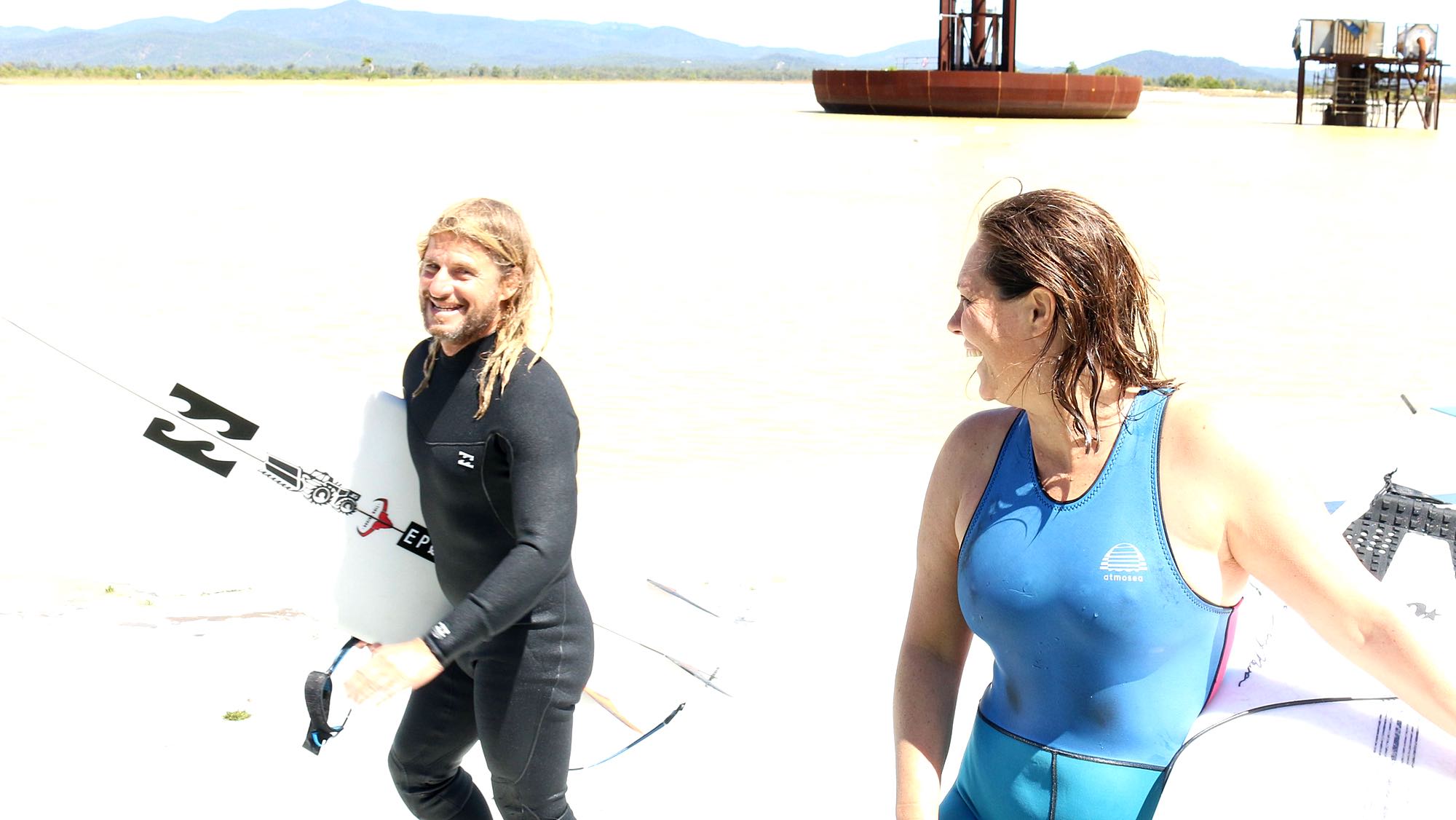The science behind why surfing makes us happy

Surfers are often stereotyped as laid-back, easy-going people who don’t have a worry in the world. Of course, the reality is surfers around the world are diverse and just as complex as any other human. However, anyone who has felt that magic sensation of riding their first wave can attest that there is something special about the activity that lifts your spirits.
While the stoke of surfing has existed for hundreds, maybe thousands, of years, that euphoria we feel while surfing is now being proven by science. There is mounting evidence that surfing does, in fact, make you happier.
Most recently, in December of 2022 a study was released in the International Journal of Environmental Research and Public Health that showed a positive relationship between surfing and mental well-being.
So, what is it particularly about surfing that improves our levels of happiness? Surfing creates a unique concoction of factors that combines exercise, nature, meditation, sense of community, and purpose.
Let’s take a look.

Surfing improves mental health
In the aforementioned study in the International Journal of Environmental Research and Public Health, researchers studied 15 women surfing over a six-week period at The Wave, a wave pool in Bristol, UK.
The most pronounced results that came out of the study were in relation to surfing’s psychosocial effects on the participants (i.e. mental, emotional, social, and spiritual).
“Improvement in self-efficacy was obtained through improvement in physical activity self-perceptions, leading to enhanced cognitive and mental health,” the report explains.
So what is it with surfing that explains these results?
The study utilizes a leading theory that regards mental well-being as having two aspects: hedonic and eudaimonic. Hedonic refers to our pursuit to feel enjoyment and pleasure, while eudaimonic refers to our desire to do meaningful things in life.
Study participants consistently expressed that surfing led to improvements in hedonic well-being, reporting they felt “exhilarated”, “energized”, and/or “positive” after surfing. And in the eudaimonic dimension, participants described feeling more mindful with a greater sense of individual growth and achievement.
The report does acknowledge that they would need to do more research in more diverse populations to solidify their findings.

Surfing is excellent exercise
It’s no secret that regular exercise is a key component to physical and mental well-being. Exercise controls weight, combats diseases, improves mood, and boosts energy, among other things.
Surfing happens to be a great form of cardio and strength exercise – developing your shoulders, back, legs, and core.
When we exercise, our body releases endorphins, a chemical that reduces the perception of pain and triggers a positive feeling in the body.
At the same time, endorphins boost the release of dopamine, a neurotransmitter that has a positive correlation with mood.
A lesser known benefit of exercise is its effects on our memory.
A study done by the University of British Columbia showed that regular aerobic exercise (exercise that gets your blood pumping, like surfing) appears to boost the size of the hippocampus, the part of the brain that plays a role in verbal memory and learning. These results were not replicated by exercise that focused solely on resistance training and muscle toning.
Is there a better aerobic exercise than sprint paddling full speed to the top of the wave pool? I think not!
And according to Harvard Medical School, exercise has both direct and indirect benefits on our memory.
“The benefits of exercise come directly from its ability to reduce insulin resistance, reduce inflammation, and stimulate the release of growth factors—chemicals in the brain that affect the health of brain cells, the growth of new blood vessels in the brain, and even the abundance and survival of new brain cells,” explained Heidi Godman in Harvard Health Publishing. “Indirectly, exercise improves mood and sleep, and reduces stress and anxiety. Problems in these areas frequently cause or contribute to cognitive impairment.”

Surfing connects you with nature
The study conducted at The Wave also speculates that surfers’ exposure to nature could play a role in mental health and happiness.
“Being in blue and green spaces has also been shown to be linked to improved mental health, potentially mediated by being in a healthier environment conducive to social interactions, restoration, and physical activity,” the study explains.
Surfing intimately connects us with nature, providing an escape from the noise, stress, and chaos of the concrete jungle. And being outside leads to more sun exposure (in healthy doses) that allows surfers to access the benefits of vitamin D.
Sunlight provides our bodies with vitamin D, which leads to increased serotonin, a hormone that stabilizes mood, increases happiness, and promotes healthy sleep.
Finally, surfing teaches us to care about our natural environment. Being immersed in the ocean and accessing its waves as a source of happiness and joy naturally teaches the importance of caring for the environment. Maintaining the environment that makes surfing possible suddenly becomes ultra important to those who discover surfing.
Surfing gives you a sense of community and purpose
While surfing sometimes grabs negative press about localism and exclusivity, most surfers will agree that this represents a minority of those that practice the sport. Becoming a surfer is entering a new culture where you now have something in common to share with those in a new community – both locally and around the world.
According to a study published by the University of Florida, research shows that individuals who have a strong connection to their community are happier.
Reader’s Digest explains that being part of a community leads to more friendship support, more opportunity to teach and learn from others, health improvements, strengthened cooperation, and greater empathy and compassion.
In addition, surfing can provide a sense of purpose in life. Once you become a surfer, you learn to wake up early, skip on unhealthy habits that may negatively affect your performance, and you gain a sense of purpose to always have your eye on where to catch the next swell.
According to ThoughtCo. meaningful activities that have a sense of purpose are better at evoking long term happiness. They explain that we all have a happiness “set point” that is determined by a mix of genetics, our environment, and ourselves. Engaging in purposeful activities, like surfing, can keep our happiness levels consistently above the set point.

Surfing teaches patience and meditation
Surfers all know the waiting game. Sometimes you have to sit for a long period of time between sets, or wait for your turn in line at the wave pool. Being patient and calm during those moments is something that surfing can foster and develop outside of the water as well.
As per deliveringhappiness.com, learning patience can help feel satisfied with life. Being patient leads to appreciating life, accepting things the way they are, letting things go, and being kind to oneself.
Similarly, surfing can serve as a form of meditation.
Wikipedia defines meditation as “a practice in which an individual uses a technique… to train attention and awareness, and achieve a mentally clear and emotionally calm and stable state.”
Surfers can attest that paddling out and riding waves often achieves exactly what that definition describes. When we surf, we are ultra-focused on our environment and any other thoughts or worries fade away as we hunt our next wave.
A prescription for… surfing?
The mental and physical health benefits of surfing have not gone unnoticed. Doctors around the world, in places such as France, England, and California, are now prescribing surfing to patients. Surfing is being used to combat conditions like depression, back pain, PTSD, heart disease, diabetes, and obesity.
Those prescribing surfing don’t claim it is a replacement to traditional methods of support, such as talk or physical therapy, but instead a complement to increase happiness and well-being.
For example, a study published in the American Journal of Occupational Therapy claims that sports-oriented occupational therapy, including surfing, can be a feasible complement to traditional therapy methods for those suffering from PTSD.
But whether subscribed by a doctor or not, surfing therapy programs are popping up all around the world and spreading the stoke of surfing.
The benefits are clear: Surfing is fun, surfing makes you happy, and surfing leads to stronger mental health.
If you aren’t a believer by now, it’s about time you hop on a board and experience the transformative power of surfing for yourself, either in the ocean, in a wave pool, or ideally, both.
Related Coverage
